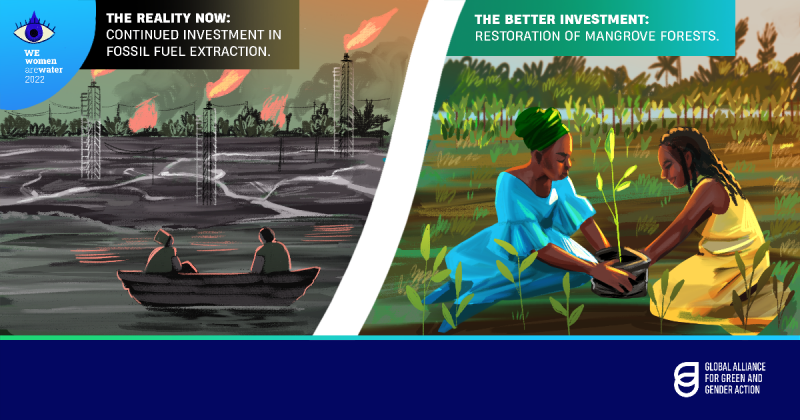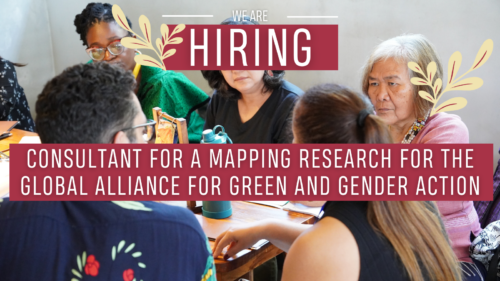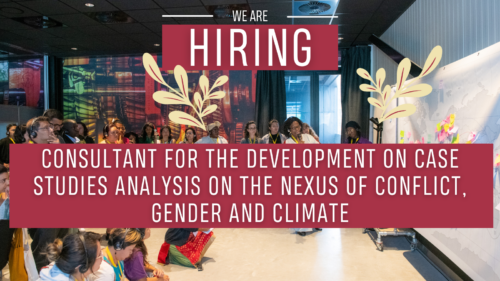Women restore mangrove forests in the Niger Delta

Long story short: International financial institutions continue to invest in fossil fuel extraction which is driving the climate crisis to dangerous levels and polluting local communities’ water, and therefore, affecting their livelihoods, health and food sources. These institutions must shift their resources towards the true, gender-just climate solution being implemented by women and girls in the Niger Delta: Mangrove habitat restoration.
The reality now: continued investment in fossil fuel extraction
In the Niger Delta’s Yorla Oil Field, the farming and fishing community of Yaataah have seen their water become increasingly polluted. Decades ago, the women of the community would soak their cassava tubers in the Yaataah River for days to ferment them before processing the cassava into their staple food. The local Kwawa women were renowned potters, earning their income from moulding clay from the river into traditional pots for dance, herbs, drinks and cooking. The water now is too contaminated with petroleum hydrocarbon to process their cassava or make their clay pots, and the river banks are strewn with the remains of fish and crab carcasses.
The Yaataah community plays host to an oil flow station with three oil wells, and the river has become contaminated by crude oil spills from Shell Petroleum Development Company’s activities with its joint venture company the Nigeria National Petroleum Corporation. With time, the community has witnessed the impacts of gas flaring, oil exploration activities and artisanal refining: acid rain, black soot, high temperatures, dryer soil, higher tides, delayed rains, desertification, destruction of marine habitats and mangrove decimation.
In areas of the Niger Delta where mangrove forests have disappeared due to the toxicity of oil spills, they are being replaced by nipa palms — a foreign species introduced over a century ago. Over the past four decades, nipa palms have invaded the Yaataah River, destroying the indigenous mangroves in the area which served as a crucial breeding habitat for fish and crustaceans, and a carbon sink for the environment. This made life even more difficult for women whose livelihoods depend on the hunting and selling of West African Mud Creeper, a species of snail that is a staple of local cuisine.
The better investment: restoration of mangrove forests
The Niger Delta is the third largest mangrove forest in the world and its mangroves are important nature-based solutions to the climate change crisis. They store carbon four times more than traditional rainforests, serve as shoreline protection against floods and storms with their dense root systems, prevent erosion, and maintain water quality and clarity. They are a hub for biodiversity all while providing various economic benefits. However, mangroves may disappear completely from the Niger Delta in the next 50 years if nipa palms continue to quickly multiply and oil spills remain an issue.
With no mangroves and thus no shellfish to harvest for income, women took matters into their own hands. A local gender and environmental rights organisation called the Lokiaka Community Development Centre has trained 250 community women and girls in mangrove restoration and biodiversity management to increase carbon sequestration, restore people’s livelihoods, revive biodiversity and clean the water of petroleum hydrocarbons. Through this process, women have cleared nipa palms from 36 plots and restored about one million mangroves — and this is just beginning. Lokiaka Centre plans to restore at least 500,000 mangroves a year and 5 million mangroves within the decade.
Lokiaka Centre’s efforts are contributing to climate change mitigation and adaptation while ensuring the community’s women and girls are involved in the project from its design to its implementation. In the process of restoring their devastated environment, the women and girls of Lokiaka are seeing their first sign of hope that their livelihoods will be restored and that their water will clear up: crustaceans have returned to this vital mangrove habitat.
Who’s leading this gender-just climate solution?
The Lokiaka Community Development Centre is a local partner of Both ENDS, Global Greengrants Fund and Mama Cash, who are all part of the Global Alliance for Green and Gender Action. Established in 2009, it is a self-led organisation working for and with Indigenous women farmers and human rights activists from the Niger Delta. The group provides training and engages in advocacy, campaigning, forest restoration, conservation and management, alliance building and knowledge exchange to secure Indigenous women’s land rights and ensure that women are seen as important stakeholders in decision-making related to their land and environment.
The Lokiaka Community Development Centre has been carrying out campaigns targeting Shell and the Nigerian government to provide potable water in communities, and is pushing these actors to clean, remediate and restore the Ogoni environment. You can follow their work here and learn more through the following links:
- The Nigerian Activist Trying to Sell Plants to the Oil Company That Destroyed Them
- Niger Delta women demands for climate justice
- Women Advocate Zero Gas Emission in Niger Delta
You can also find this story in Bahasa Indonesia, Filipino, French, Hindi, Mongolian, Nepali, Portuguese, and Spanish.
Above graphic illustrated by Andrea Paredes.

We Are HIRING: Consultant for a Mapping Research for the Global Alliance for Green and Gender Action
The Global Alliance for Green and Gender Action (GAGGA) is seeking a consultant to conduct Mapping Research aimed at identifying…

We Are HIRING: Consultant for the development on Case Studies Analysis on the nexus of Conflict, Gender and Climate
The Global Alliance for Green and Gender Action (GAGGA) is seeking a consultant to develop case studies and analysis on…

Report: Seeds for Harvest – Funding for Gender, Climate, and Environmental Justice
The world has drastically changed in recent years, from the COVID-19 pandemic and ongoing conflicts to the rise of authoritarianism…
Subscribe to our newsletter
Sign up and keep up to date with our network's collective fight for a gender and environmentally just world.
